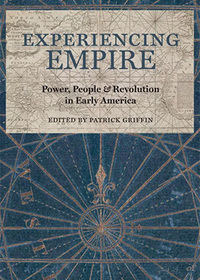
- University of Notre Dame
- Madden-Hennebry Professor of History
- Academic Concentration: Seventeenth- and Eighteenth-Century Atlantic History
- Residential Fellow (2017-2018)
- "The Age of Atlantic Revolution(s): An Interpretation"
Patrick Griffin is the Madden-Hennebry Professor of History at the University of Notre Dame. He specializes in seventeenth- and eighteenth-century Atlantic history.
Professor Griffin is the author of several books on colonial America and early modern Irish and British history, including The People with No Name: Ireland’s Ulster Scots, America’s Scots Irish, and the Creation of a British Atlantic World (2001); American Leviathan: Empire, Nation, and Revolutionary Frontier (2007); America’s Revolution (2012); and The Townshend Moment: The Making of Empire and Revolution in the Eighteenth Century, forthcoming. His current manuscript project focuses on the age of Atlantic revolution. He is also editor of Experiencing Empire: Power, People, and Revolution in Early America (forthcoming) and, with Peter Onuf, co-editor of Between Sovereignty and Anarchy: The Politics of Violence in the American Revolutionary Era (2015).
Professor Griffin is the recipient of several awards, including grants and fellowships from the American Council for Learned Societies (2004-2005), the Huntington Library (2015), an Andrew Mellon Fellowship for the Study of Intellectual History (1997), and a Filson Fellowship (2001).
Publications
-
Experiencing Empire: Power, People, and Revolution in Early America
University of Virginia Press, 2017

Born of clashing visions of empire in England and the colonies, the American Revolution saw men and women grappling with power— and its absence—in dynamic ways. On both sides of the revolutionary divide, Americans viewed themselves as an imperial people. This perspective conditioned how they understood the exercise of power, how they believed governments had to function, and how they situated themselves in a world dominated by other imperial players.
Eighteenth-century Americans experienced what can be called an “imperial-revolutionary moment.” Over the course of the eighteenth century, the colonies were integrated into a broader Atlantic world, a process that forced common men and women to reexamine the meanings and influences of empire in their own lives. The tensions inherent in this process led to revolution. After the Revolution, the idea of empire provided order—albeit at a cost to many—during a chaotic period.
Viewing the early republic from an imperial-revolutionary perspective, the essays in this collection consider subjects as far-ranging as merchants, winemaking, slavery, sex, and chronology to nostalgia, fort construction, and urban unrest. They move from the very center of the empire in London to the far western frontier near St. Louis, offering a new way to consider America’s most formative period.